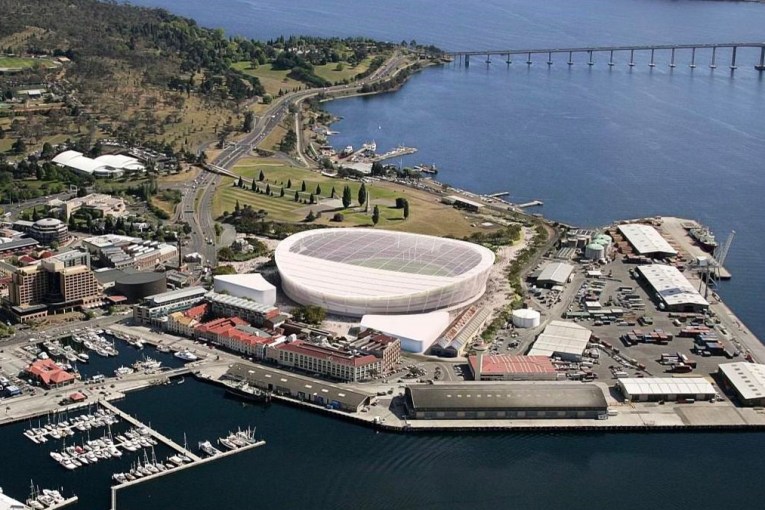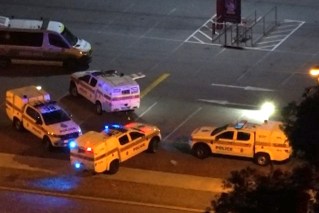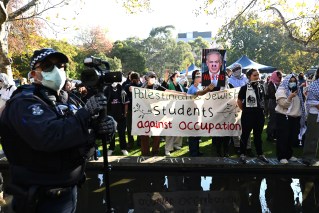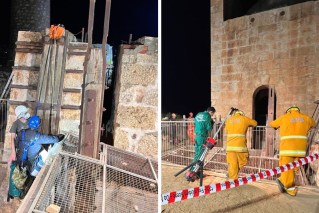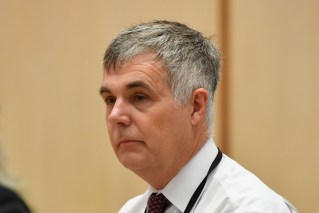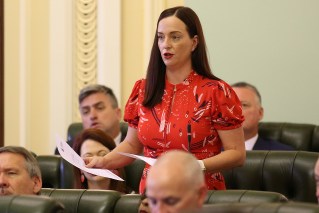Explainer: The crisis pitting Saudi Arabia against Qatar and why Donald Trump is making things worse

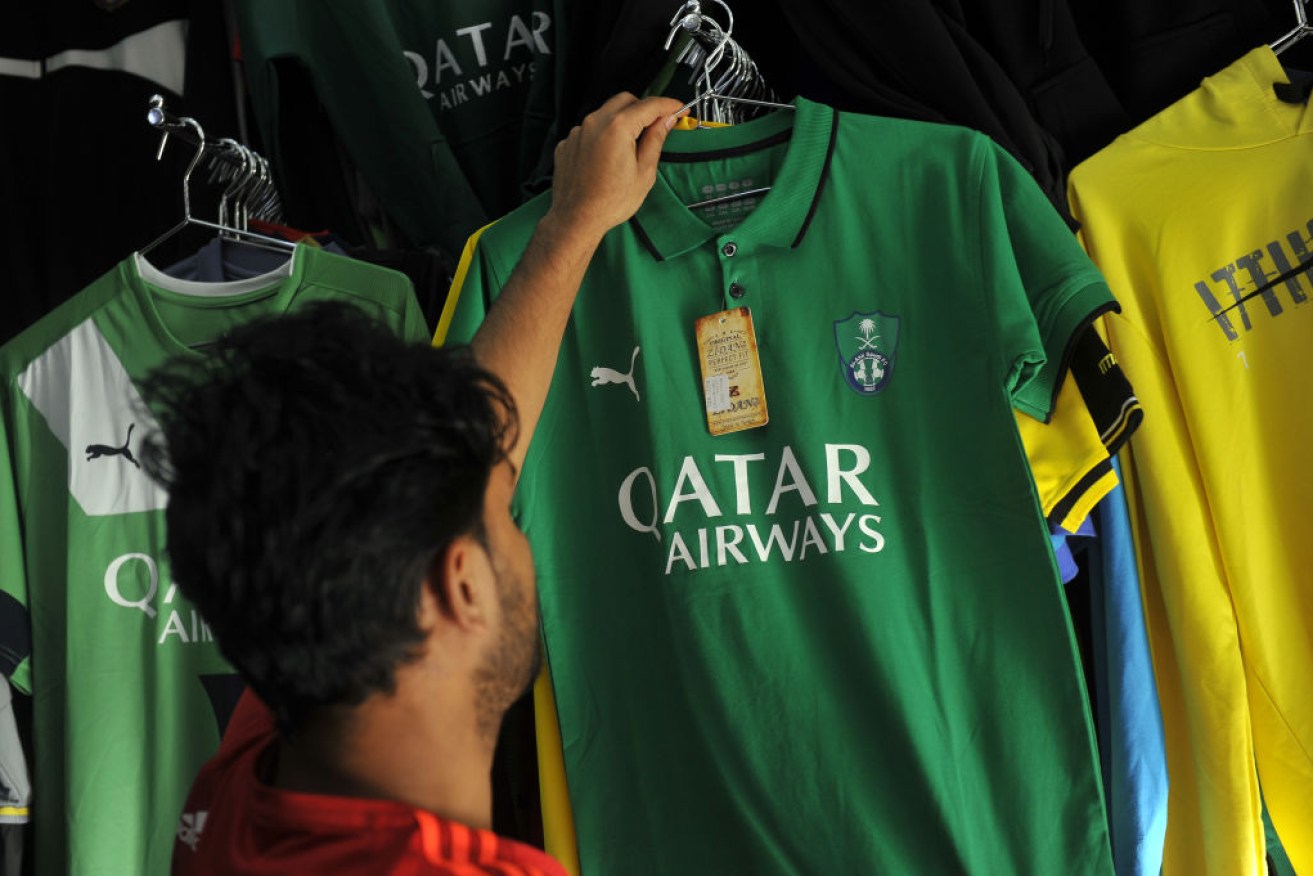
A man looks at a shirt of Saudi Arabia's Al-Ahli Football Club bearing a Qatar Airways' logo in the city of Jeddah on Tuesday Photo: Getty
Saudi Arabia has led eight other countries in severing ties with Qatar, with US President Donald Trump supporting claims the oil-rich monarchy has been funding terrorism – and risking the loss of a key US regional ally in the process.
Qatar has denied the allegation, with intrigue and speculation surrounding the question of what brought the long-simmering feud to boiling point and triggered the current diplomatic crisis.
The Financial Times advances one theory in a report detailing how Qatar is said to have paid a $US1 billion ransom to secure the release of royal family members kidnapped on a hunting trip in southern Iraq.
According to the paper’s sources, that payment, made in April, somehow ended up being split between an al-Qaeda affiliate in Syria and Iranian security officials.
This “crazy deal” raised concerns Qatar has been funding instability in the region, a view amplified by Mr Trump in a series of midnight tweets.
Dr Anthony Billingsley, a senior lecturer at the University of New South Wales and Middle East expert, noted Saudi Arabia is in no position to accuse others of stoking conflict in the region.
“The argument that Qatar has been aiding and abetting extremist groups rings a little bit hollow because the Saudis have been up to their throats in blood money, paying extremist groups – either paying them or turning a blind eye,” Dr Billingsley told The New Daily.
He said Qatar may well have paid the ransom, but he did not think this was sufficient grounds to justify the breaking of diplomatic ties.
Meanwhile, the fallout has also been blamed on Russian hackers allegedly planting fake news on Qatar’s state news agency, US and Qatari officials told CNN.
The US is investigating that claim, which revolves around the allegation that fabricated quotes attributed to Qatar’s leaders were inserted into stories published by the state-run news agency. Those quotes allegedly expressed pro-Israel and pro-Iran sentiments.
Here again the fog swirls thick and dark. No Qatari who values his life would say a kind word about Israel, not when the country provides a safe haven for the head of Hamas and lavishly funds its fighters in Gaza.
As for Iran, few Qataris need to be told that their nation operates joint oil fields with Tehran’s rulers and that, despite the Arab world’s ancient divide between Shia and Sunni, the nations have set aside their religious differences to foster a cordial relationship.
“Qatar has very close ties to Iran,” Dr Billingsley noted.
“It shares a massive oil and gas field with Iran and really has little choice but to have some sort of sensible relationship with the country.”
Nevertheless, FBI officials have been sent to Doha, the Qatar capital, to investigate the hacker claims, the line of investigation being that Russian cyber mischief has been aimed at causing a rift between the US and a key regional ally. About 10,000 American troops are stationed at a US base in Qatar.

Donald Trump, Melania Trump, Saudi Arabia’s King Salman bin Abdulaziz al-Saud (centre) and Egyptian President Abdel Fattah el-Sisi (left) in Saudi Arabia in May. Photo: Getty
If the Russian hackers exist and if that was their intention, Mr Trump may well have achieved their goal for them by shooting from the lip.
During my recent trip to the Middle East I stated that there can no longer be funding of Radical Ideology. Leaders pointed to Qatar – look!
— Donald J. Trump (@realDonaldTrump) June 6, 2017
Qatari Foreign Minister Sheikh Mohammed Bin Abdulrahman al-Thani told CNN the “entire crisis” was based on misinformation.
“Whatever has been thrown as an accusation is all based on misinformation, and we think that the entire crisis being based on misinformation,” the foreign minister said.
“Because it was started based on fabricated news, being wedged and being inserted in our national news agency which was hacked.”
Further complicating the Gulf crisis is the proxy war being fought by Saudi Arabia and Qatar in Yemen, where the two nations are backing rival sides in the ongoing civil war. Qatar has sided with Iran in supporting the predominately Shia rebel Houthi movement.
“The Saudis have become almost manic in their desire to inflict some sort of strategic defeat on Iranians,” said Dr Billingsley, cautiously optimistic that tensions will subside.
“I wouldn’t expect this to drag on too long … If it were to start to become more serious, America would be forced to take some action and bang some heads together.”

Donald Trump and Qatar’s Emir Sheikh Tamim Bin Hamad Al-Thani take part in a bilateral meeting in Riyadh in May. Photo: Getty
Meanwhile, while Mr Trump criticises Qatar, the Pentagon has praised the nation for hosting US forces and its “enduring commitment to regional security”.
Pentagon spokesman Navy Captain Jeff Davis declined to answer a question about whether Qatar supported terrorism, saying: “I’m not the right person to ask that. I consider them a host to our very important base at al Udeid.”
So good to see the Saudi Arabia visit with the King and 50 countries already paying off. They said they would take a hard line on funding…
— Donald J. Trump (@realDonaldTrump) June 6, 2017
…extremism, and all reference was pointing to Qatar. Perhaps this will be the beginning of the end to the horror of terrorism!
— Donald J. Trump (@realDonaldTrump) June 6, 2017
Another factor may well be figuring in Mr Trump’s vocal sympathy for the Saudi regime.
On his recent visit to the region he inked sales contracts for US-made military equipment worth an estimated $400 billion.
